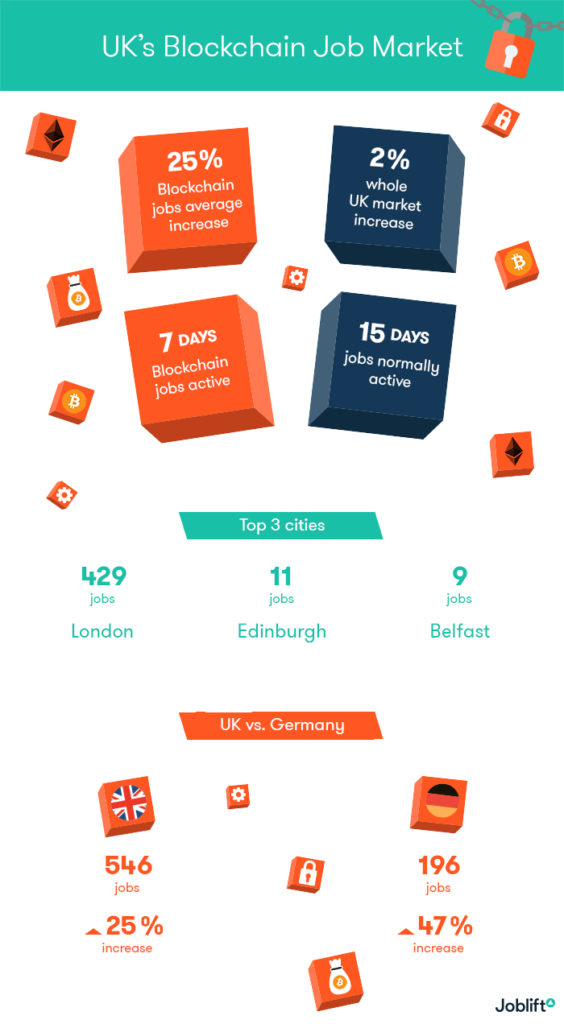The blockchain has been hailed as the internet’s latest revolutionary technology, but has the internet buzz word been over-hyped or is it the real deal, and how does the UK compare against competitor Germany when it comes to this new disruptive tech?
Job meta-search engine Joblift has analysed the UK’s blockchain job market in comparison with Germany to show that confidence still lies with the UK. Joblift’s studies also show that the UK has seen a significant monthly increase of 25% in the number of blockchain jobs advertised in the last 12 months, highlighting the rapid growth of this sector in Britain.
>See also: How blockchain will make the UK’s digital economy thrive
The blockchain job market has seen an average monthly growth of 25%, with these jobs being filled in under half the time of the UK average.
According to Joblift, 546 blockchain jobs have been posted in the UK since August 2016, with these jobs increasing, on average, by a fourth every month. For context, this monthly increase is huge in comparison with the 2% average monthly increase of the UK’s job market as a whole in the same time frame.
Another indicator of the rapid growth shown by this industry is the amount of time these jobs stay online without being filled. In the last 12 months, blockchain jobs have stayed open online for an average of seven days before being filled.
This is less than half the time of the whole UK job market average – the median number of days that a job in the UK was active for since last August is 15 days.
London dominates in terms of blockchain jobs, but Edinburgh and Belfast are emerging as up-and-coming hubs.
London’s domination in terms of UK cities is unsurprising, and it boasts a huge 79% of all blockchain vacancies being located in the UK. The capital has housed 429 positions in the last 12 months and the capital has seen an average monthly increase of 33%.
>See also: Does Blockchain have the power to revolutionise UK government?
Interestingly, Edinburgh ranks as the city with the second highest number of blockchain jobs posted in the UK (11 positions).
This comes after news that the University of Edinburgh will be launching Europe’s first blockchain university course this year – a fact which will no doubt boost Edinburgh’s standing as an emerging blockchain hub.
The city which comes in third place in terms of blockchain vacancies is Belfast (9 positions), although – like Edinburgh – the Northern Irish capital houses significantly less jobs than its English counterpart.
The UK vs Germany
According to the report, London house 24 times more vacancies than Berlin, but Germany as a whole has seen more monthly growth.
Germany has been regarded as the UK’s main European rival when it comes to emerging technology industries, particularly concerning finance, like blockchain.
However, Joblift’s research shows that the UK has posted almost three times more blockchain vacancies than Germany has in the last 12 months (Germany has advertised 196 positions).
>See also: The business of Blockchain in financial services
When it comes to monthly increase, though, Germany has the upper hand. The average monthly increase for blockchain jobs in Germany is 47% compared to the UK’s 25%.
Looking more closely at the capital cities, London still trumps Berlin in both the number of jobs being posted and the rate of job market growth. Over the past 12 months, 429 jobs have been advertised in London which is 24 times more than the number posted in Berlin (18 vacancies). Also, Berlin has seen an average monthly increase of around 29%, while the number of jobs posted in London has increased by approximately 33% on average.








